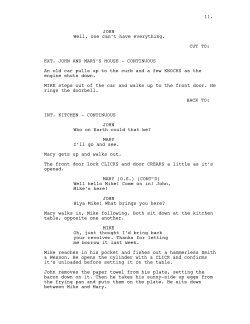Talk:wrylie
Add topic
Prior to 1927, there were only shooting script formats for film. The scripts included solely action, text captions, and music direction. With the advent of talkies in 1927, spec scripts were born and soon evolved into a standard format that included only:
- Character titles, centered in CAPS.
- Dialogue, indented and centered with wide margins.
- Action, indented with narrow margins.
A 1:1 ratio of page-count-to-runtime contributed to the standard format, seen there ⇒
Studio screenwriters with scanty scripts felt pressured to meet the 80 to 90-minute runtimes of the era's feature films, so they concocted a formatting sleight of hand to fill up space by inserting parenthetic direction, a.k.a. a wrylie, between the character title and action, e.g.:
JOHN
(to himself)
Well, one can't have everything.
Additionally, they often padded the page count by including camera directions (e.g. O.S. for off screen) on a line of its own:
MARY
(O.S.)
Well hello Mike. Come on in! John,
Mike's here!
Amateur screenwriters noticed the trend and mistakenly assumed wrylies were expected as standard practice. So, in following suit, they wrote stuff like:
JOHN
(surprised)
Hiya, Mike! What brings you here?
MIKE
(jokingly)
Oh, just thought I'd bring back your
revolver.
I don't offhand remember the name of the studio exec who, in 1932, coined the term wrylie to disparage the trend of such parenthetic direction, but his pun applied NOT in the sense of a Tom Swifty but to the space-eating connivance of studio screenwriters and to the ham-handed formatting (not to mention the writing style) of amateur spec script writers.
The use of wrylie, as borrowed by literary critics to throw shade at "A prosaic phrase, typically including an adverb with the -ly suffix, that attributes dialogue to a character" is a fairly recent development. I first heard it used by Stephen King, who said that "J.K. Rowling never met a wrylie she didn't like." Most film industry outsiders don't know what a wrylie is, so he is frequently quoted instead as, "J.K. Rowling never met (an adverb) she didn't like." His intention is obfuscated whenever he's quoted that way.
I can't locate a source to cite Stephen King's exact wording as I heard it in 2007, but if someone can find the quote & upload it as Equinox recommended, that might be useful. --Kent Dominic (talk) 09:04, 20 June 2021 (UTC)
